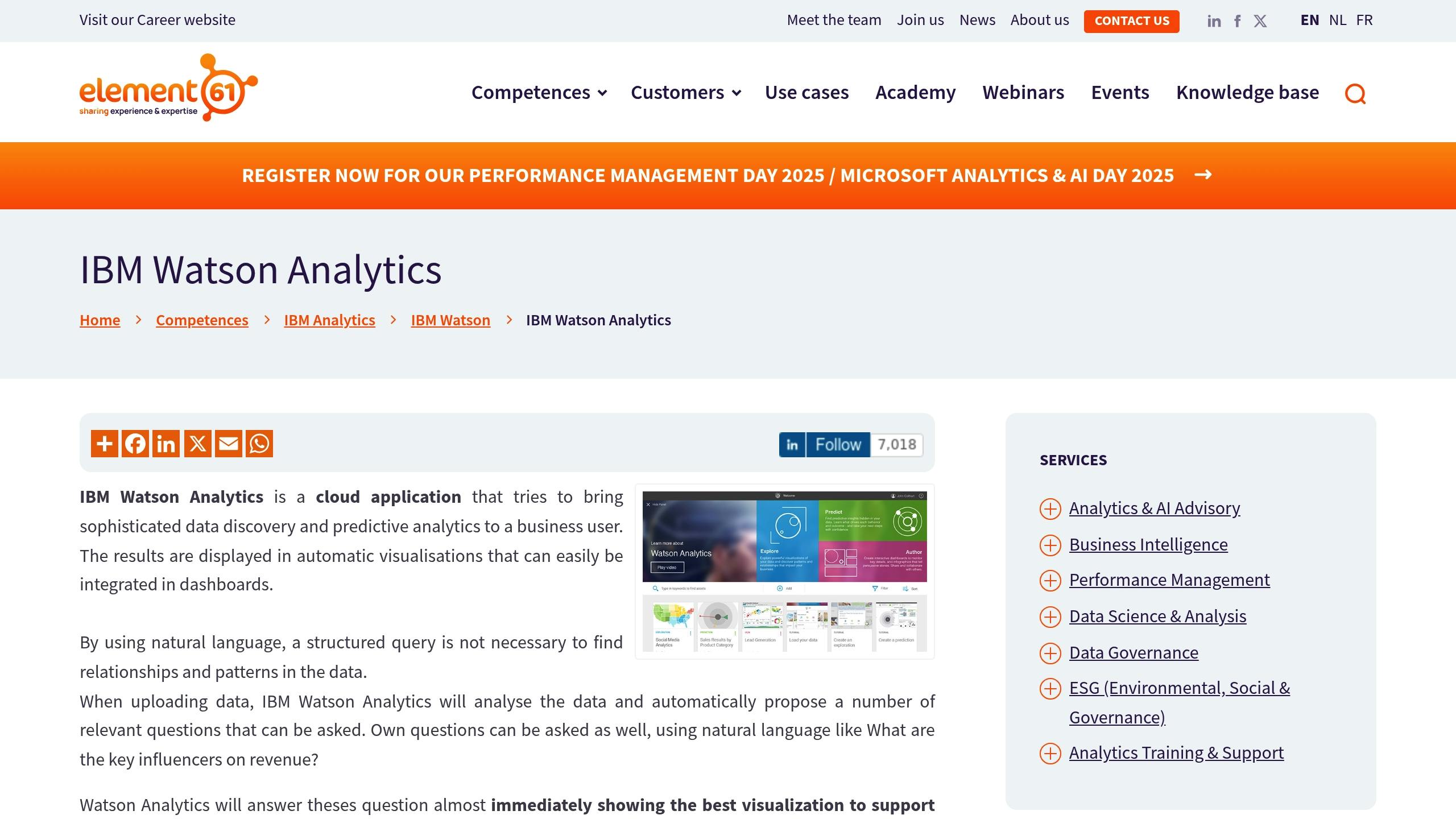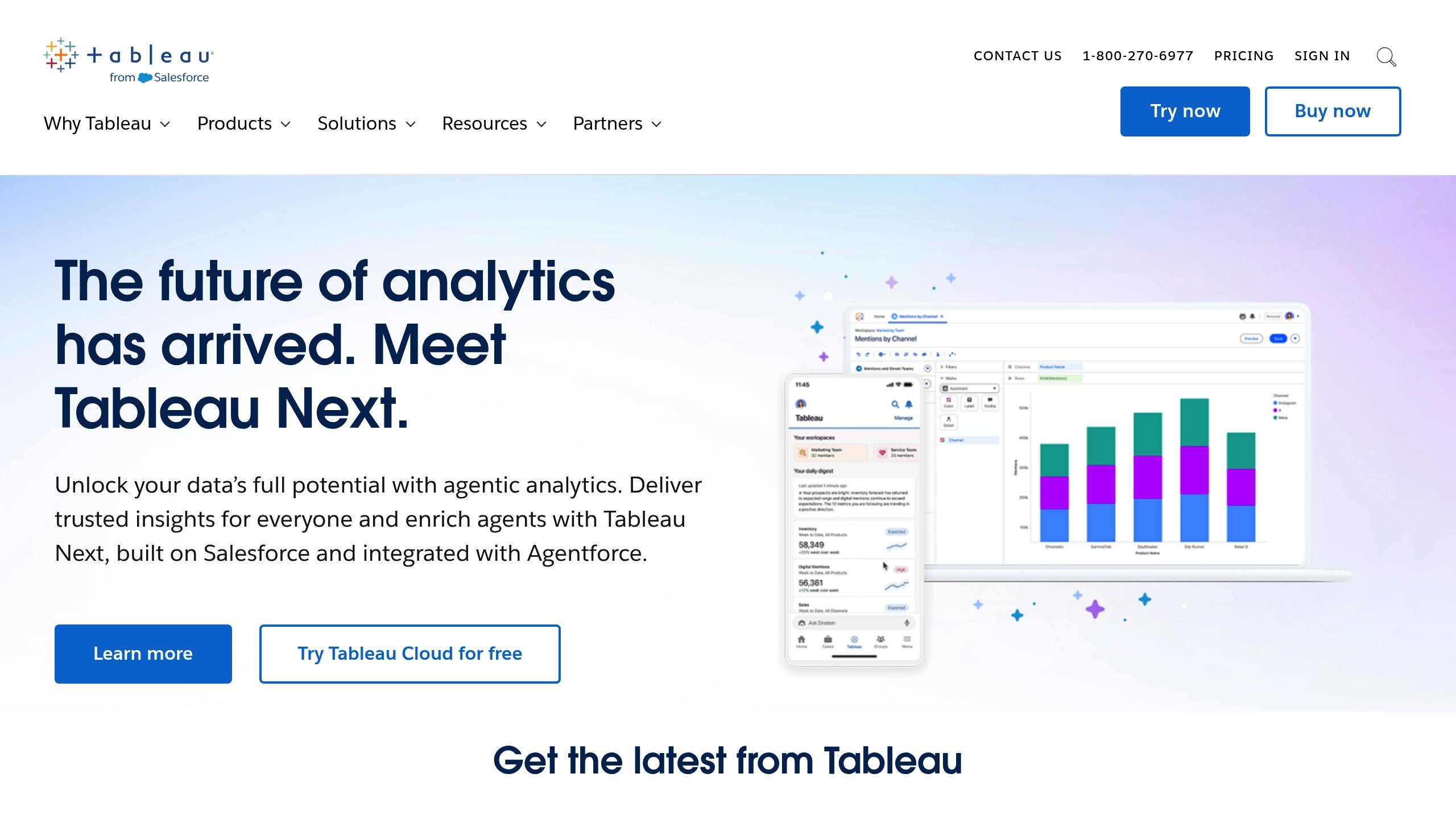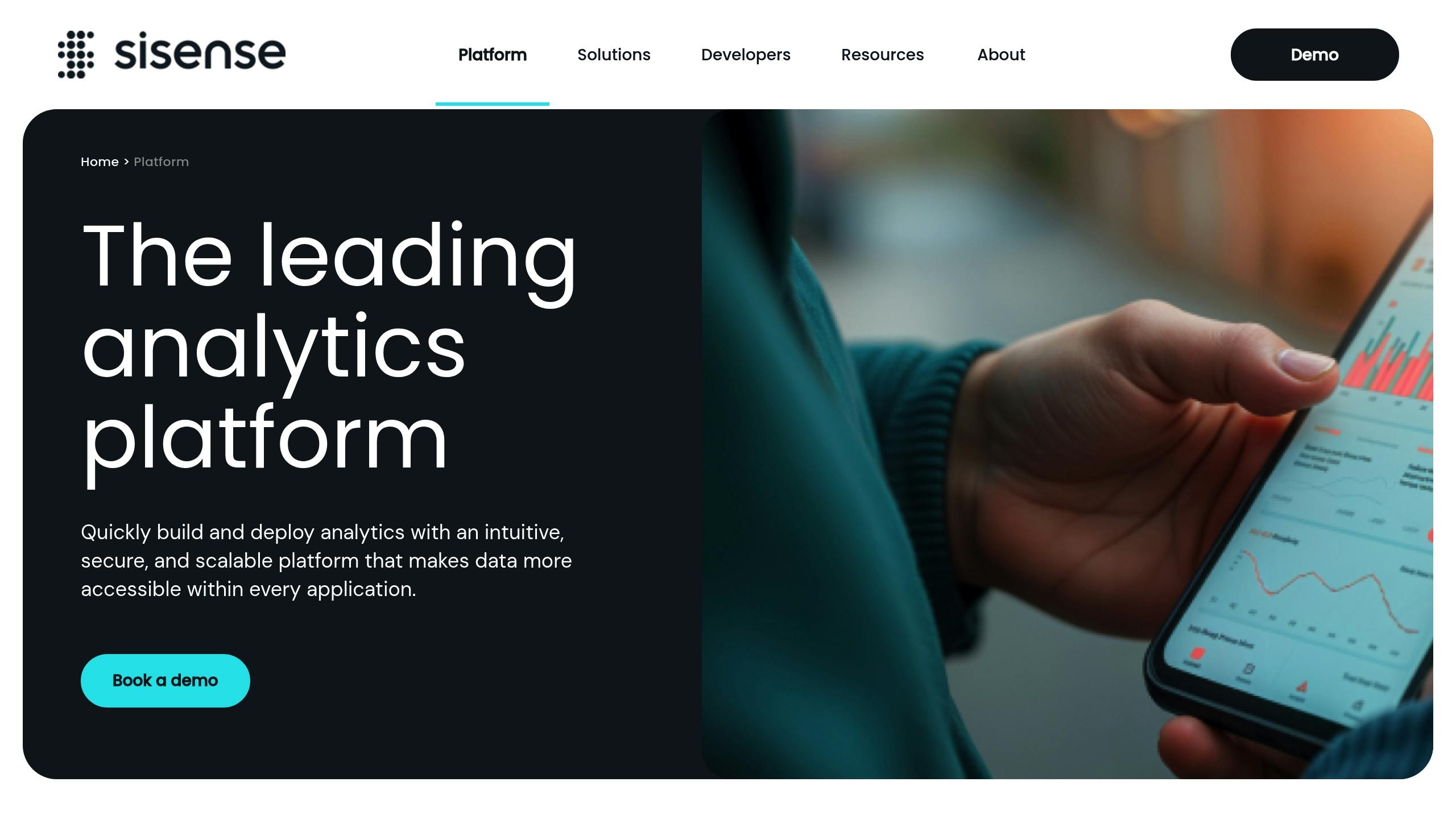AI-powered analytics tools can help mid-size companies save time, reduce costs, and make better decisions. They automate repetitive tasks, deliver real-time insights, and simplify complex data analysis. Here’s a quick look at six AI tools tailored for mid-size businesses:
- Shurco.ai: Combines analytics, workflow automation, and customer engagement with quick setup.
- IBM Watson Analytics: Offers scalable AI analytics with flexible pricing and strong integrations.
- Tableau with AI Features: Simplifies data visualization and predictive analytics with AI-driven tools.
- Google Cloud Smart Analytics: Built on BigQuery, it integrates AI for scalable, cost-effective analytics.
- Microsoft Power BI: Affordable, user-friendly analytics with enterprise-level features.
- Sisense: Focuses on self-service analytics with natural language queries and predictive insights.
Quick Comparison
| Tool | Key Features | Pricing (Starting) | Best For |
|---|---|---|---|
| Shurco.ai | Real-time insights, workflow automation | Free AI assessment | Quick setup and automation |
| IBM Watson Analytics | Scalable AI analytics, secure insights | $10.60/user/month | Advanced analytics and integrations |
| Tableau | AI-driven visualizations, predictive tools | Custom pricing | Data visualization and guided analytics |
| Google Cloud | BigQuery, scalable AI integration | Pay-as-you-go | Scalable analytics and cloud flexibility |
| Microsoft Power BI | Smart visualizations, predictive analytics | $9.99/user/month | Affordable, user-friendly analytics |
| Sisense | NLP queries, predictive analytics | $40,600/year | Self-service analytics and scalability |
These tools cater to a range of business needs, from cost-effective solutions to advanced AI capabilities. Read on for detailed features, pricing, and real-world examples.
Top 10 AI Tools for Your Business | Business Analytics Tools
1. Shurco.ai

Shurco.ai is designed for mid-size businesses that need powerful tools without the complexity. It brings together AI-driven analytics, workflow automation, and customer engagement tools in one easy-to-use platform.
The platform is up and running in weeks - not months. It offers flexible hosting options, including Azure, AWS, or on-premises for businesses requiring extra control over their data.
Its features are built to deliver measurable results. IT Director Marc K. shared:
"Shurco.ai powered our analytics to deliver real-time insights into sales and operations. Better data has cut costs, predicted trends, and improved efficiency."
Here’s where Shurco.ai stands out:
| Feature | Capability | Business Impact |
|---|---|---|
| Analytics & Insights | Real-time data analysis and trend prediction | Reduces costs and boosts operational efficiency |
| Workflow Automation | Automates tasks and simplifies processes | Saves 100+ hours weekly on repetitive tasks |
| Customer Engagement | AI-driven chatbots and response systems | Resolves 80% of customer inquiries instantly |
Customer Experience Lead Leon R. highlighted the platform's impact:
"Our team was overwhelmed until Shurco.ai's chatbot took over 80% of customer inquiries, dramatically speeding up response times and boosting satisfaction."
Most businesses see tangible savings and performance improvements within 3–6 months. Head of IT Procurement Rosetta B. added:
"Shurco.ai automated repetitive tasks, saving us over 100 hours weekly. Its quick, no-tech setup has transformed our operations."
For businesses unsure where to begin, Shurco.ai offers a free AI assessment to pinpoint areas where it can make the biggest difference. It's an easy way for mid-size companies to explore AI without committing upfront.
2. IBM Watson Analytics

IBM Watson Analytics is an AI-powered analytics platform designed for mid-size businesses. It can handle data at an impressive speed of 500 GB per second - equivalent to processing one million books.
The platform offers three pricing options to suit various business needs:
| Plan | Cost | Best For |
|---|---|---|
| Free | $0 | Basic analytics with limited capacity |
| Standard | $10.60/user/month | Core analytics features |
| Premium | $42.40/user/month | Advanced analytics capabilities |
IBM Watson Analytics simplifies data preparation, provides secure insights, and supports deployment on-premises, in the cloud, or through IBM Cloud.
Similar to Shurco.ai, Watson Analytics turns raw data into actionable insights. Companies like Lindt Canada (using Cognos Analytics for over 20 years), L'Oréal (automating report validation), and the Royal Bank of Scotland (improving real-time decision-making) highlight its real-world impact.
The platform also integrates smoothly with Microsoft tools and connects to various data sources via IBM Cloud Pak for Data. This includes compatibility with popular tools like Tableau, SQL, and Sisense.
Businesses using Watson Analytics often report productivity gains of 15% to 40%. Additionally, Watson Assistant implementations have shown a 337% return on investment.
Annual costs for the software range from $13,920 to $188,473, with a median of $39,749. Its ability to organize unstructured data into meaningful insights helps companies stay competitive. Plus, the automation features reduce reliance on large data science teams, making advanced analytics accessible even for businesses with limited technical expertise.
3. Tableau with AI Features

Tableau simplifies data analysis for mid-size companies with its secure Einstein Trust Layer. Recognized as a 12× Gartner® Magic Quadrant™ Leader, Tableau blends powerful visualization tools with AI-driven insights to turn complex data into actionable results.
Two standout features, Tableau Pulse and Einstein Copilot, provide automated insights and guided analytics. These tools have already delivered measurable results across industries, especially when paired with Salesforce:
- Einstein 1 Platform Processing: 27% faster
- Data Cloud: Over 24 trillion records processed monthly
- Slack integration: 36% productivity boost
Source:
The practical benefits of these features are evident in real-world examples. At Box, the Global Security Office uses Tableau Pulse to improve efficiency. Michelle Zuzik, Data Transformation Strategist at Box, shares:
"With Tableau Pulse, everyone, from our CISO to line managers, can easily analyze key metrics, such as the mean time to contain (MTTC), and all the contributing factors that impact our results. With Pulse, we can really drive the efficiency and effectiveness of our global security organization."
Similarly, the John Lewis Partnership has seen operational improvements. Libby Hickey, Tableau Product Manager at John Lewis Partnership, highlights:
"Simply by centralizing our data, Tableau Pulse provides us with easy-to-use insights and visualizations that can streamline our business and save us millions."
For businesses worried about compatibility, Tableau offers native connectors for various data sources - like spreadsheets, PDFs, and cloud databases - and an Extensions API for smooth integration with existing tools.
In manufacturing, one mid-size company used Tableau's AI features for predictive maintenance, cutting downtime and extending machinery life. Meanwhile, a retail company leveraged Tableau to analyze purchasing trends, forecast demand, and optimize inventory, enhancing customer satisfaction.
With strong security measures in place, Tableau ensures sensitive data remains protected while delivering tailored insights. This makes it an ideal choice for mid-size companies seeking enterprise-grade security without the hassle of managing multiple systems.
sbb-itb-32f4d4f
4. Google Cloud Smart Analytics
Google Cloud Smart Analytics brings together data analytics and AI, designed for mid-sized businesses looking for enterprise-level solutions that are easy to use. At its core is BigQuery, which supports SQL, Python, and Spark engines to cater to different skill sets within a team.
With BigQuery as the foundation, the platform integrates seamlessly with Vertex AI, enabling businesses to apply Large Language Models (LLMs) to their existing data. This capability has been a game-changer for companies like Priceline. Allie Surina Dixon, Director of Data at Priceline, explains:
"BigQuery gave us a solid data foundation for AI. Our data was exactly where we needed it. We were able to connect millions of customer data points from hotel information, marketing content, and customer service chat and use our business data to ground LLMs."
The platform's pricing structure makes it especially attractive for mid-sized businesses. Here's a look at its impact:
| Metric | Performance Impact |
|---|---|
| ROI over 3 years | 222% |
| Annual benefit | $1.09M |
| Infrastructure cost reduction | 26% |
| IT team efficiency improvement | 41% |
| Break-even period | 8 months |
Source:
These numbers highlight how businesses across various industries can benefit.
TELUS, under Stephen Lee's leadership, transitioned 3,000 ETL mappings and 1,700 tables to Google Cloud, speeding up decision-making processes. Lee notes:
"The speed of innovation at Google Cloud has been excellent. There are continued updates to BigQuery, Cloud Composer, Dataflow, Vertex AI, enabling us to accelerate data-driven decision-making across our organization, deliver faster, more personalized customer solutions, and harness the transformative potential of gen AI."
Scalability is another strength of the platform. General Mills' Vice President of Data Analytics, Rich Rubenstein, highlights this advantage:
"Having a scalable place to land all our data helps us move quickly and gives us the confidence that as we get more data, we have the tools we need to go fast. To process, analyze, and act on our data to improve and grow the organization."
Google Cloud's pay-as-you-go model makes it even more accessible. Businesses receive $300 in credits and free access to over 20 products within monthly limits. Built-in features like budgets and AI-powered recommendations help companies manage costs while scaling their data analytics.
HCA Healthcare provides a compelling example of how the platform can transform operations. Mangesh Patil, Chief Analytics Officer, shares:
"We are building our unified data and AI foundation using Google Cloud's lakehouse stack, where BigQuery and BigLake enable us to securely discover and manage all data types and formats in a single platform to build the best possible experiences for our patients, doctors, and nurses."
5. Microsoft Power BI
Microsoft Power BI offers an analytics platform perfect for mid-size companies that need enterprise-level tools without unnecessary complexity. Its AI-powered features help turn raw data into actionable insights through smart data discovery, visualizations, and predictive analytics.
Power BI's pricing is appealing for mid-size businesses:
| Plan | Price | Key Features |
|---|---|---|
| Power BI Pro | $9.99/user/month | Data connectors, 48× daily refresh |
| Power BI Premium | $20/user/month | Advanced AI tools |
| Power BI Embedded | $4,995/capacity/month | Custom integration options |
Source:
"Having all of our data in one single place… has allowed us to quickly build dashboards… helping improve the speed to insight." - Anthony Reed, Foods Data Product Manager at Marks & Spencer
By integrating with Azure AI and Microsoft 365, Power BI enables mid-size companies to access advanced analytics without needing deep technical expertise. Its security features, like easy permission management through Azure security groups, provide strong data protection. This combination of features supports scalable growth and measurable returns.
A study by Forrester Consulting found that businesses using Power BI alongside Microsoft 365 saw a 321% return on investment over three years. Power BI's versatility is evident across industries. For instance, the New York City Department of Education uses Power BI dashboards to give over 100,000 educators and administrators access to detailed student performance data.
"The results have been outstanding, with an estimated £8 million financial profit within a matter of months, with growth expected to continue as more teams adopt the platform." - Elena Walker, Digital Manufacturing Leader at Rolls-Royce
With the business intelligence software market expected to hit $13 billion by 2025, tools like Power BI are poised for continued growth and adoption.
6. Sisense

Sisense delivers AI-powered analytics tailored for mid-size companies. Its user-friendly, self-service design makes it possible to perform advanced analytics without needing extensive technical skills. Let’s break down the platform's pricing, features, and why it’s a great fit for growing businesses.
Pricing Overview
Sisense offers tiered pricing based on your deployment needs. Here’s an estimate for a 12-month plan:
| Package | 12‑Month Cost |
|---|---|
| Essential | $40,600 |
| Advanced | $69,600 |
| Pro | $109,000 |
Source:
Features That Stand Out
One of Sisense's standout features is its natural language processing (NLP), which allows users to query data in plain English. This capability is particularly useful for organizations like USA Swimming, where data plays a central role in decision-making.
"We're trying to enable our teams and coaches around the country to think in new ways and to look at data in different ways, and Sisense is helping us to do that." – Patrick Murphy, Senior Director of Data and Product, USA Swimming
Here’s what Sisense brings to the table for mid-size companies:
- Predictive Analytics: Machine learning tools that reveal hidden patterns in data.
- Automated Insights: AI-driven insights that save time and improve decision-making.
- Flexible Integration: Pre-built connectors for platforms like Salesforce and Google Analytics ensure smooth integration. Source:
Scalability and Integration
Sisense has proven its ability to scale. By 2024, the company achieved over $100 million in revenue and employed more than 800 people. For cloud hosting, businesses can expect to spend around $50,000 annually for 50 users.
The platform also integrates seamlessly with tools like CRM systems, project management platforms (e.g., Asana, Jira), and other data sources through its API, creating a unified analytics environment.
While the initial investment may be higher, Sisense’s robust features and ability to grow with your business make it a strong choice for mid-size companies looking to make data-driven decisions.
Conclusion
Recent data shows that AI analytics can increase revenue by 3–15% and improve sales ROI by 10–20%. These gains often result from choosing tools that prioritize integration, cost management, and security.
Key Factors to Consider
When selecting an AI tool, focus on these critical aspects:
- Integration with Existing Systems
The tool should work effortlessly with your current setup to deliver immediate results. Kit Cox, Founder and CTO of Enate, highlights this point:
"A powerful AI tool should be able to integrate smoothly with your existing systems. Check for API support and compatibility with your current software stack. The easier the integration, the quicker you'll realise the benefits."
- Cost Analysis
Look beyond upfront costs and consider the total cost of ownership. Here's a breakdown:
| Cost Factor | What to Evaluate |
|---|---|
| Implementation | Initial setup expenses |
| Maintenance | Ongoing support and updates |
| Scaling | Costs for additional users or features |
| Training | Staff education and related resources |
- Security and Compliance
With 77% of businesses exploring AI solutions, it's crucial to ensure tools offer encryption, regular security audits, and certifications for compliance. Data governance should also be a priority.
Real-World Results
AI tools are already delivering measurable outcomes:
- Sales teams see a 20% improvement in performance.
- Organizations save 20–30% on SG&A expenses.
- Companies experience up to a 40% boost in operational efficiency.
Sam Ward, Head of AI Research and Development at Enate, advises:
"An AI tool worth its salt should be intuitive and user-friendly. Complexity should happen behind the scenes, allowing your team to integrate the tool into their existing workflows without requiring extensive training. Focus on tools with a clean interface and comprehensive, easy-to-understand documentation."
Keeping Your Investment Relevant
With 90% of business leaders planning to expand AI usage in the next two years, it's essential to choose tools that can grow with your organization. Look for solutions with regular updates, strong integration options, flexible pricing, and active vendor support. A tool that evolves alongside your business ensures long-term benefits.
Mark Cuban puts it bluntly: "Learn AI or risk obsolescence within three years."
